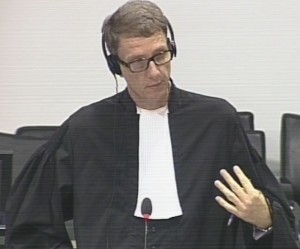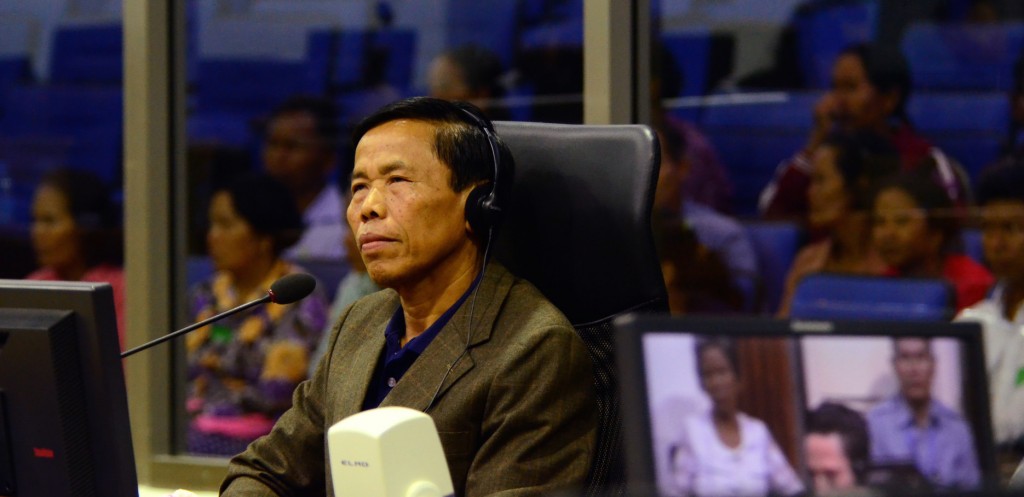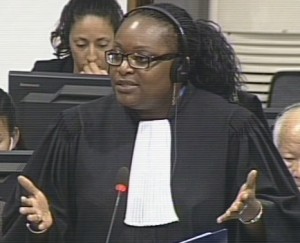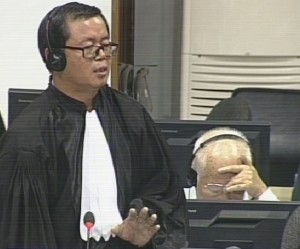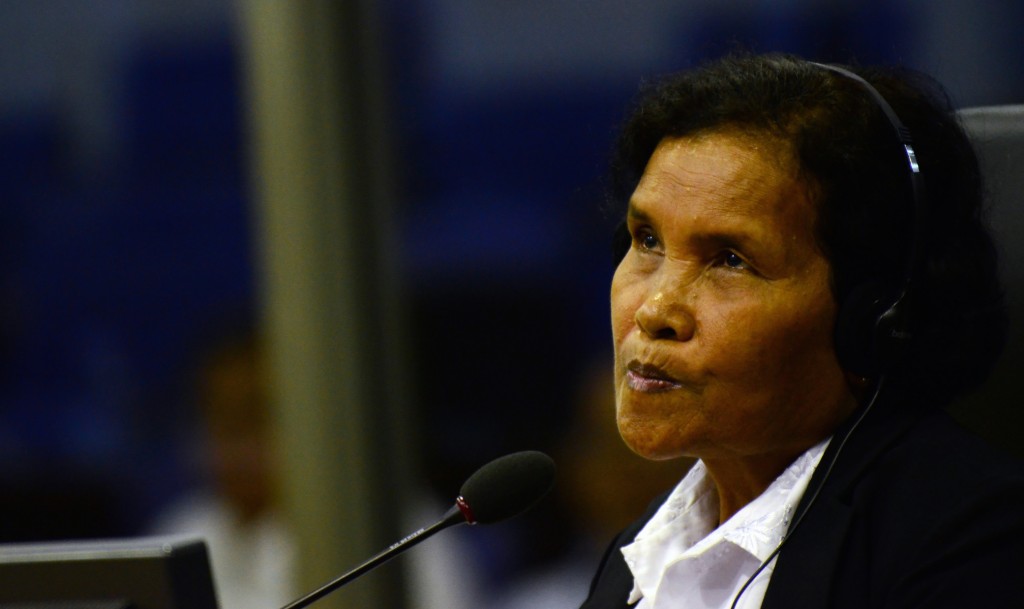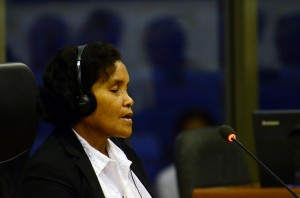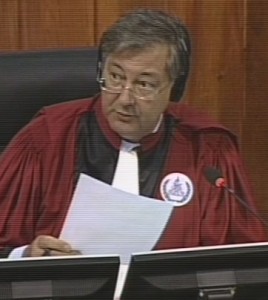“My Husband Disappeared One Week After Our Wedding.” – Back to the Kampong Chhnang Airport worksite
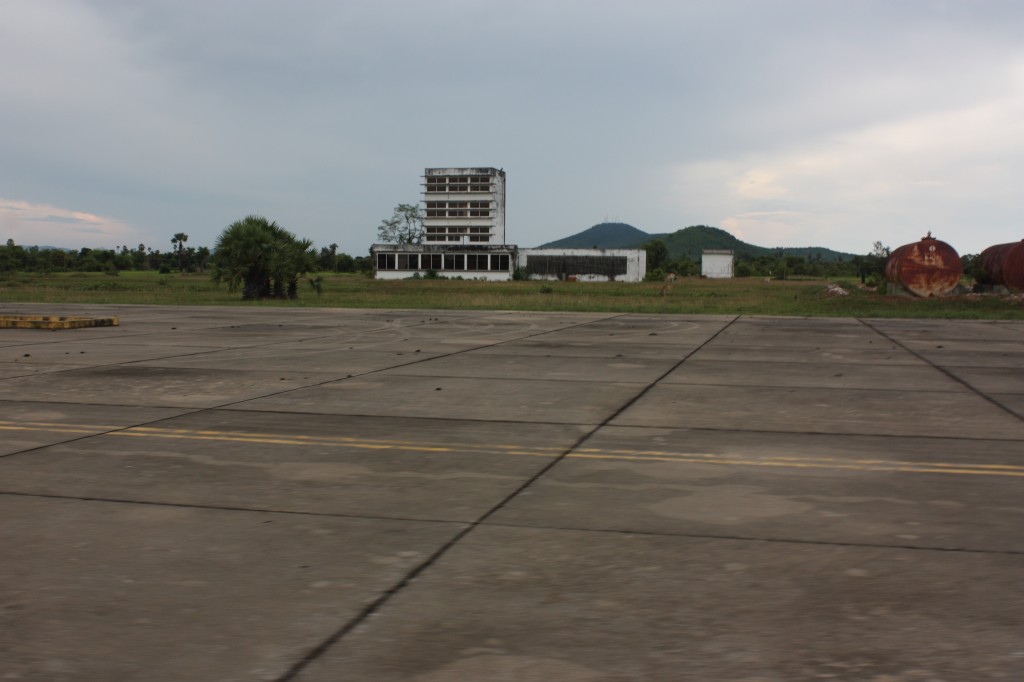
A rare picture of the Kampong Chhnang Airport, which lies completely abandoned today (Courtesy of Kim Sovanndany from DC-CAM)
Today, on July 29, the Court finished the cross-examination of witness Mr. Soeum on the Trapeang Thma Dam and started hearing a witness on the Kampong Chhnang Airport, who had not been able to attend the hearings when they were held on that topic.
Before the hearing of the witness got on its way, the Chamber asked the prosecution to explain when the 66 DC-CAM statements that the defense was talking about yesterday would be translated.
Mr. Travis Farr, Senior Assistant Prosecutor, responded that firstly the OCP does not intend to rely on all 66 documents. Secondly, 55 of those were already on the list filed in June 2014 by the OCP, with summaries in English, French and Khmer, and thus all parties have been on notice of the contents of the documents since that time. Farr says that 25 of them have been translated into English.
Farr explains that the Chamber’s position has been that there is too much material and that each party should prioritize in an ongoing basis what it wishes to be translated. Additionally he explains that material that is not translated by the end of the trial will not be considered by the Chamber. He then adds that all parties, thus, have been on notice for more than a year and that additionally, each party has has Khmer speaking members who can ask questions in Khmer to Khmer speaking witnesses.
Judge Lavergne asks Mr. Farr if those 55 Farr is mentioning are the same one that that are on the defense’s list submitted the day before. Lavergne then says that only 13 are in English, and asks Farr to perhaps do some research over lunch to determine how long it is going to take to translate them into English at least.
After Lunch, Farr says that his team has come to the conclusion that translation all the remaining documents into French and English would amount to 790 translation pages and he is talking to the translators to see how long that would take.
___
Mr. Victor Koppe, co-lawyer for Nuon Chea, is then given the floor to cross examine Mr. Soeum who had started his testimony the day before.
Secret arrests?
“If arrests were secrets, as you said,” Koppe started, “how did you know about them?”
Mr. Soeum explained he said that the arrests were made secretly because when they came to arrest people they did not inform anyone. “That is why I said they were made in a secretive manner,” he said.
Mr. Koppe was just warming up. He now asks:
“You said you were horrified because there was no justification [for the arrests]. If people were not notified how could you be horrified?”
“I was fearful because of what happened. I was afraid I had acted wrongly and that I would be arrested,” Mr. Soeum responds.
Koppe insists: “Were you in a position to say whether [the arrests] were justified or not?”
“Everyone minded his or her own business. It would be risky to say anything. We kept our mouths shut,” Mr. Soeum responds.
“Isn’t that speculation?”
“That was my personal observation. I did not know the reasons. So I had to be very careful and I was fearful,” he responds.
Golden–Fanged Man
Mr. Koppe again reads from the same DC-Cam statement and the same quote, although he reads further, that he had confronted the first civil party with. Farr objects but it is overruled.
Koppe reads: “I rarely met them, but these people, Ta Val and Ta Moeung were very good at reprimanding people, they were unkind and ruthless. Ta Val was called the golden-fanged man because he never responded with clear words and we never understood what he was saying.”
Mr. Soeum does not know or cannot recall any of this. He only knows that Ta Val disappeared in 1977 but cannot remember when. Mr. Koppe recalls that it seems it happened on the 17th of June of 1977. Mr. Soeum still cannot confirm this.
Mr. Soeum also does not know if rice was stored secretly or if there was any fighting between the north zone and the south west zone. Mr Koppe tries to press the point by reading another statement that allegedly implicates Ta Val with Ruos Nhim’s alleged treason. Only after double objections from the national and international prosecution, does the court sustain the objection. Koppe still does not understand why, or so he says, and the president says that the questions was repetitive.
Ta Chil (son of Muol Sambath alias Ruos Nhim – secretary of the NW zone)
Mr. Soeum says that Ta Chil did chair a meeting that he attended but does not know ho he is related to.
Mr. Koppe then reads from a 15 march 1978 interview Ta Chil gave to Yugoslavian journalists. In the interview Ta Chil says that people were given beef, pork, fish. Mr. Soeum says that they were given those kinds of food once in a while, for example after big conferences.
In the interview Ta Chil also says that marriages were performed when proposals were received. Mr. Soeum agrees that some marriages were voluntarily but some were forced. He repeats that sometimes marriages were done in the dark and so the spouses could not tell who was their husband or wife after the ceremony.
“Before they got married they did not know each other at all. After the ceremony was completed, some of them could not find their wives,” he said. “The wedding was not beautifully decorated at that time, like it is today,” he adds. He says he knows this because some men told him.
After 1979 some of the couples that got married during the DK remained together, Mr. Soeum says, because he met them, and some of them got divorced. Mr. Soeum does not know about why they were divorced.
—
Anta Guisse, lawyer for Khieu Samphan, then takes the floor.
Mr. Soeum says that he is a teacher, although he had said yesterday that he was rice farmer before the Chamber. Mr. Soeum denied that yesterday he had said that he was a rice farmer.
He confirms that he has lived all his live in, Phnom Srok district, in Battambang Province (which is where the Trapeang Thma dam is located).
He also explains that after the Dam was built, rice could also be farmed in the dry season but insists that he didn’t pay any attention as to why the Dam was built when he was there. But he then says, that to his understanding, the Dam was built to improve the agriculture of the area. He confirms that, although the dam is being patched up, it is still used.
Mr. Soeum then repeats that those who were healthy or fat were required to stand in the front lines. He said that he was skinny and swollen and so “was not required to stand in the front.” The arrangement was made within the group unit. When Guisse doesn’t get the answer she’s looking for she says she will move on as “perhaps it is too complex.”
Mr. Soeum confirms that he never say any machinery at the Trapeang Thma dam. “We only had earth-carrying basket and tools to work,” he said, “manual work was used to construct the dam and bridge.”
To Mr. KONG Sam Onn, Co-Lawyer for Khieu Samphan, Mr. Soeum says that he did two types of work at the dam. He helped built it and then he also helped maintain it. He says that while he was building it, he built the embankment and the crest of the dam. For the rest of them time he maintained it, which meant patching up broken segments and patching the places where the bridge was unstable, until he left towards the end of 1977. He does not know when he stopped building and when he started maintaining it, apart from saying that it was during the rainy season that he remembers maintaining it because the water pressure from the rainy season sometimes was too strong.
He confirms that there were many workers engaged in building the dam but that after it was completed only a few mobile units remained. He said that when he ran away in late 1977 it was almost completed.
Mr. Soeum does not know who gave the orders that fat or healthy people stand at the front in meetings.
With that, Onn sits down and the testimony of witness Mr. Soeum is completed.
—
Witness Ms. Khin Vat takes the stand as perhaps the last witness on the Kampong Chhnang (KC) Airfield. For some reason she had not been able to attend, or had not be summoned, when the segment on the KC airfield that started on June 17, 2015.
Ms. Vat, 65, born in O village, Punley commune, Baribour district, Kampong Chhnang Province, then took the stand. Her father’s name is Van Kuy, and her mother’s is Din Vin(both deceased). Her husband’s name is Chhi Srun and they have five children together..
She was interviewed once by the OCIJ at her house.
Mr. Farr, senior assistant prosecutor, took the lead to start the examination.
Ms. Vat said she arrived to the Kampong Chhnang Airport (KC) in July 1977 where she worked in the rice paddy fields. She was sent there because it was said her husband had “bad tendencies” because he had been linked to the Vietnamese. She was working in Pochentong Airport and as soon as it was found out that her husband had “bad tendencies” she was transferred to the KC Airport. She understood that “all the trust was removed” from her and that is why she was transferred.
She learned that her husband, Loud, disappeared one week after her wedding and then she was transferred to KC. She said that she learned of her husband’s disappearance through a friend of her husband who smuggled a letter in a food container so that it would reach her. The letter just said that people from Phnom Penh had come to arrest her husband. The letter also advised her no to make any inquiries about her husband because if she did she would be taken away and killed. Her husband was the chief of an unit and he was the driver of the Chinese who were measuring land at the Kampong Chhnang Airport.
Ms. Vat was in unit 304, division 502 of the Southwest Zone. In 1975, her hundred-woman group was assigned to clean up the Pochentong airport so that the Chinese could teach Khmer soldiers there.
Leaders of KC Airport
She recalls perfectly that the commander of 502 was Ta Met and his deputy was Ta Lvey. She also remembers Tuok.
She does not know details of Met’s tasks but she remembers attending meetings that he chaired. She remember Met instructing his soldiers to be loyal to him and to complete the work because that is what Angkar wanted. He did not explain what Angkar was but she understood that it referred to the upper level. She remembers him saying that the work should be completed quickly so that planes could land.
Lvey, she said, was Met’s deputy and he usually accompanied the Chinese and also supervised the soldiers. She said that Lvey did not “educate” them or ever spoke to his group. Tuok was Lvey’s assistant. He was in charge when Lvey was away, for example, when he went to Phnom Penh. She claims that Lvey went to Phnom Penh (sometimes 3 to 4 times a month) to receive work instructions from his superior Ta Met. She said she knew this when she was a cook and “worked close to him.” She said Tuok did speak to her when she was a cook but the communication ceased when she was assigned to work at the rice fields. ‘
Working at KC airfield
Ms. Vat said she cooked for the Chinese in a house located to the East of the KC airfield. The first floor of the house was in cement and then second was made of floor. She said the Chinese ate by themselves as the Khmer staff and leaders had another kitchen.
She stayed at Wat Pratheath and was assigned to do rice farming about one kilometer away from the runway. She said that she still could see the construction from there. She said she saw soldiers pushing carts and laying cement to build a five-story building under the direction of the Chinese. She said the Chinese also installed the explosives. She later said that she saw these things when walking past them on her way to rice-farming and sometimes crossed the run way. She said she saw no guards at that time watching over the workers.
Ms. Vat says that Division 502 led the work at the KC Airport worksite. Apart from 502 she only knows that some of her colleagues were from the East Zone, but does not know if they were soldiers or which division they were from.
Ms. Vat says that she remembers discussing with her colleagues that they were being worked too hard. She learned about “tempering” or “re-fashioning” when she arrived at the KC airfield because she had never work that hard or with so little food before. She says though that she was not re-educated there but she does say that she was forced to work even if she was sick.
Force One and Two
Force one (associated with 502), she explained, was composed of healthy men and women without children. They were assigned to build the KC Airport: some transported gravel, other blasted the rock, and they were also instructed to build the runway. She said they also built caves and reservoirs to store fuel for planes. She explains that apart from division 502 there were other groups there like those soldiers from division 3. She does not know the details of their work schedules or food rations as she was in another group.
Force two, was for weak people, “like me,” she said, and were assigned to grow vegetables among other things.
Working Conditions
Her work schedule started at 5. She would then attend a meeting where the workforce was assigned. The meetings were chaired by Mali (phonetic). At 7 a.m. she would go to the rice fields. They would have dinner at 5 p.m. After that, if there was an assignment to make fertilizer she would work until 9 p.m.
For food she received steamed rice, soup with morning glory or water lily and fish, either from the Tonle Sap or dry fish. She felt it was not enough as it was rationed and she did not feel she ate her fill. Sometimes she had to drink water to feel full, she said.
Hygiene was not available at all she said. The water was not boiled and workers had diseases. Under hot weather, she explained, five to ten workers out of 90 would be sick every day. The sick people who could walk were assigned lighter tasks. The ones could not walk or eat would be sent to a hospital.
There were many workers who died from numbness, fatigue and malaria she said. She estimated that in her rice farming unit five workers (out of 90) died from illness.
Purges and Disappearances
Ms. Vat retracts from her OCIJ statement where she had said that she had heard Lvey talking about the purges that were necessary to root out all those with Vietnamese links. In Court she said she doesn’t know as she did not attend those meetings.
She remembers that Ourng disappeared too. She used to accompany the Chinese team and sometimes worked with Ms. Vat. Ms. Vat was told that Angkar had requested her to get re-educated and Ms. Vat concluded that she had been arrested. “Although I do not know this as a fact, it is my personal conclusion from what I observed,” Ms. Vat said.
She also remembers that another woman in her battalion, Khon, also disappeared in 1977. She is not aware of any other cases of disappearances.
Suicide
Ms. Vat said that a rock transportation driver told her that one person threw his or herself into the wheels of the truck and he could not break on time and killed the worker. According to Ms. Vat, the driver understood that it was intentional as the person ran towards the truck.
Ms. Vat remembers another suicide where someone killed him or herself by throwing themselves out of a car, but Farr does not press her on this. Ms. Vat does not know or recall intentional killings at the worksite.
Paranoia
She remembers being vigilant about her movements because he was told that if anyone disobeyed they would be removed. She knew that if she was reported to the upper levels she would be in trouble. She was fearful because she knew her husband had been arrested and people were suspicious.
Khieu Samphan visits
Ms. Vat says that Khieu Samphan and his colleagues visited the Airport. She says she knew that he came to inspect the worksite.
She says she did not see him in person but that she knew he came to visit. She knew this, she said, because her colleagues told her. She said her friends told her that Uncle Samphan had visited. She said that Ta Mok had also come in that delegation.
After some questions from Mr. VEN Pov, Civil Party Co-Lawyer, the Bench takes the floor.
Judge Lavergne asks for the whole name of her husband Laod but cannot recall his first name, originally from Kendal province and he was handicapped. Ms. Vat said he lived in division 11.
He then asks how many Chinese guests she cooked for and what they did. She says that at Pochentong Airport they taught Khmer soldiers how to fix and fly planes and helicopters and how to use the radar. She says that she saw some Burmese and Vietnamese too there. She does not think they were technicians.
After those two questions, the court is adjourned. The cross-examination of Ms. Vat will continue tomorrow. The next witness will be related to the 1st January Dam and it seems there will be a break for the whole of next week.


